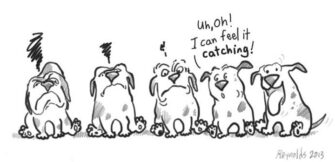Emotional Contagion in Social
Emotional contagion is the phenomenon of humans feeling and expressing emotions similar to those around them. This effect can be triggered by face to face conversations, videos, movies, photographs and even music.
Sad begets sad, happy begets happy and angry begets angry.
An analysis of Facebook charity posts from the 100 largest US charities shows that not all emotions are equally contagious. In the social media cauldron, negative spreads faster. Likes, shares and comments were higher when the charity post was more negative.
The first step in this analysis is tagging words and text as being positive or negative. Here are two examples,
- We continue to celebrate [+] the miracle of nearly 60,000 people who come together to do good [+]. Happy [+] Hanukkah! [+]
- The dogs were left bleeding [-] and in pain [-], many unable to bear weight on their paws.

The combination of positive and negative sentiment is weighted and combined for an overall polarity score and categorization, the first example being positive, the second negative. And while it’s theoretically possible for a charity post to be positive and negative and cancel out for a neutral rating, in practice it rarely happens.
The correlation between positive and negative ratings is .06, effectively no relationship.
The majority of charity posts are non-neutral and positive outweighs negative, 49% to 29% respectively.
And any emotion drives more engagement (liking, sharing, commenting) than a neutral post but positive posts produced,
- 6% fewer likes
- 18% fewer shares and
- 11% fewer comments
As for the contagion effect? Negative and neutral posts were much less likely to garner positive comments. And the flip was also true, positive posts were 44% less likely to have negative comments.
A cautionary note, ‘negative’ speaks to valence. Some negative posts induce empathy or anger, both of which can be ‘positive’ responses to the negatively framed post. However, it’s also possible (probably likely) that the negative posts induce more guilt and shame, which is low quality, external motivation to like, share or comment and not a path to long-term social media success.
As a sidenote, hashtags, mentions and URLs decrease the chance of liking, sharing or commenting. Maybe that should be headline.
Kevin


